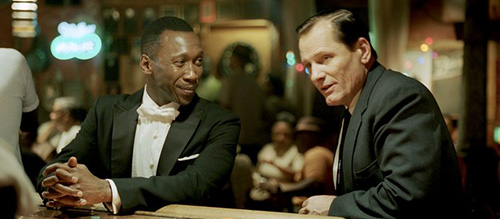Green Book’s Verdant Views on Race Allow Inherent Contradiction
When I binge Best Picture films, I’m looking to see what makes any given film great. Not every nominee reaches an uncharted pinnacle, but it’s not asking too much to expect something special from every nominee. While Mahershala Ali and Viggo Mortensen’s performances in Green Book are exceptional, they’re drowned out by larger issues that surround the film. What Green Book wants to be is in conflict with the product we get on screen, and in a year with Black Panther and BlacKkKlansman taking on racial issues with a head-on approach, it couldn’t have been more poorly timed.
Mahershala Ali (left), Viggo Mortensen (right).
When it comes to what it wants to be, Green Book isn’t a tough nut to crack. Following the story of pianist Dr. Don Shirley (Ali) and his driver Tony Lip (Mortensen) as they tour across the South, it wants to be a film about people of different backgrounds coming together to fight racism and promote unity. At the beginning, we learn that Tony and his family are racist. They “protect” women when black workers come over to Tony’s house, Tony throws away the cups those workers use, and they constantly use slurs when referring to black people. By the end, they’re all welcoming Dr. Shirley into their home for Christmas dinner because they are learning to not be racist anymore! These are noble ideas and certainly preferable to the alternative of racism, but it leads to a film that is trite, predictable and contradictory.
The first discordant moment comes when Tony stops to get some Kentucky Fried Chicken. Dr. Shirley has never had fried chicken before, prompting Tony to question how a black man had never tried fried chicken since, you know, all black people love fried chicken. Dr. Shirley rightfully notes that his race is mutually exclusive from his taste in food, but Tony continues to insist that he tries fried chicken, ending with him shoving it into Dr. Shirley’s face to end the conversation. While the movie could have taken a few moments to actually hash out that conversation about stereotypes, we’re instead treated to feel-good shots of Dr. Shirley and Tony eating fried chicken together.
What am I supposed to take away from that as a viewer?
It almost reads like “all lives matter” being used to shut down conversation about police brutality. The well-educated Dr. Shirley can’t even get a few moments to have his voice and views heard? That’s the exact opposite of the message this movie wants to promote! I know Tony is stupid, but a screenwriter more motivated to address racial issues could at least give us a good-faith debate. Just a few scenes later, we see a Southern host cater a fried chicken dinner for Dr. Shirley, and we’re supposed to go, “Oh, this is bad and racist.” But the fried chicken was just as racist earlier. The context and ignorance can’t change anything for a movie-goer in 2018, and the real issues we face today (like white attitudes towards Black Lives Matter or the disproportionate representation of black voices and views in film) are left unaddressed.
By the way, when I say Tony is “stupid”, that’s not an off-hand insult. The film almost treats Tony like a child in his understanding of racism, so as to expunge him of culpability. This is unsurprising since his son co-wrote the script, but it is another failure to address a larger issue. You know those rednecks that live in isolated small-town communities that voted for Trump due to “economic anxiety”? Green Book could be read so as to excuse those types from their racism. The fried chicken remark is far from Tony’s first expression of casual racism, but we’re almost asked to forgive him because he’s dumb. Stupidity isn’t a Get Out of Racism Free card. Continued casual racism is a problem in our society, and asking viewers to simply move on and not confront that racism is worse. Unity is a goal we should strive for, but not at the cost of having conversations about what’s problematic in our society when it comes to race.
My biggest question is: why this story is even about Tony (screenwriters aside)? This should be Dr. Shirley’s story, and the very fact that he’s relegated to a supporting role in this story about racism is at the very least ironic. Good for Tony Lip that he became less racist, but Dr. Don Shirley was an incredibly brave virtuoso that deserves the spotlight. One consequence of this is that it’s never quite clear to me why Dr. Shirley wanted to go on tour in the South. The film mentions a story about Chubby Checker being beaten in Alabama, but never gets to Dr. Shirley’s full motivation. What does he want to gain? What experience is he looking for? What message is he trying to send? My curiosity was left unsated. Dr. Shirley is ultimately there to help Tony in his journey of becoming less racist. His character arc is more about how lonely he is, and that’s apparently solved by being friends with Tony. From the film, you’d think Dr. Shirley was just Sheldon Cooper if he was a pianist. Mahershala Ali plays the role well, but it feels limited by the script.
So what makes Green Book great?
The performances, the music, some small moments of conversation are enjoyable. They aren’t ground-breaking, but they’re good. It’s textbook Oscar-bait, and was almost beat-for-beat what you’d expect this movie to be. What’s great about it is eclipsed by the larger questions that loom over the film, and the (I’m sure) unintentional contradiction to its message. Green Book shouldn’t be in the Best Picture conversation, and is the exact kind of play-it-safe nomination that the Academy should avoid anyway.


